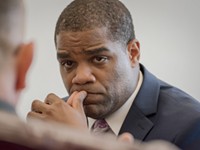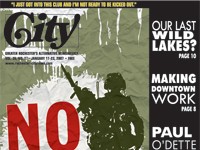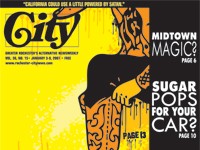[
{
"name": "500x250 Ad",
"insertPoint": "5",
"component": "15667920",
"parentWrapperClass": "",
"requiredCountToDisplay": "1"
}
]
Peg Rawcliffe looks out at her 6th-grade science class. "Who can tell me Newton's second law of motion?" she asks. Instantly, hands go up. Students' answers come faster than she can write.
"That's right, very good," she says. "It's easier to change the speed and direction of a lighter object than a heavier one. Very good."
The NorthBaptistChristianSchool where Rawcliffe teaches sits back from St. Paul Street just south of the Seneca Zoo. The two-story brick building is sheltered by trees. A cross rises above the church to the right of the school entrance. Rawcliffe's class is toward the rear of the building, overlooking the playground.
Her students are about to conduct an experiment to see if Newton was right. But first, Rawcliffe reviews the five steps of the scientific method. She quickly writes the words observation, hypothesis, prediction, experiment, and conclusion, snapping the chalk against the blackboard. Her students are eager to get to the experiment, and with little coaxing, they define each step.
Next they begin pushing their desks together into groups to form teams, and Rawcliffe hands out the materials for the experiment: black string, large paper clips she has bent into s-hooks, masking tape, bookends, and a small plastic cup filled with metal washers.
"Remember what we talked about last time?" she asks. "What about teamwork?"
"Without a manager, there was chaos," some of the students answer. That draws giggles and gestures toward those in charge.
Rawcliffe unpacks about a dozen foot-long cars the students made earlier in the week from Lego bricks, wheels, and other parts. It's hard to keep the shiny gray and yellow chassis from rolling off the desks. The slightest jolt sends them flying.
Setting up the experiment involves cutting the string, tying the washers to one end, and using the paper clips to hook the string to the back of the cars. It's an orderly process for children armed with scissors, tape, and the sharp ends of paper clips.
The team managers call out instructions, and eventually the cars are lined up on long tables in the back of the room. String is attached to one end of each car and is dangled over the edge of the table. When the washers are added to the strings, the cars take off. The more washers, the faster the cars are pulled and the harder they slam against the bookends Rawcliffe has taped to the edges of the tables. She challenges the students to record their observations and write their own conclusions on their worksheets. When some students are unsure of their answers, she directs them back to what they predicted would happen, and questions them on what they actually witnessed.
"Science," she tells them in a low and respectful voice, "is about testing what we think will happen to see if it's true. We know something is true when we get the same results over and over again, right? What would you say in this case, class? Was Newton right?"
There are no religious references during this particular science lesson. It could just as well be science in a public-school classroom.
Traditionally, when people thought of private religious education, they probably thought of small schools run by Roman Catholic nuns. But just as the number of Catholic schools began to peak in the late 1960's, another type of private, faith-based learning was gaining momentum: Protestant Christian schools.
The home-schooling movement has always enjoyed strong support among Christians. But by the early 70's, several religious ministries began taking what they had provided for home-schooling parents --- curriculum, textbooks, guidance --- and making it available to pastors and principals trying to start schools. Non-Catholic Christian education gained even more traction as the modern evangelical movement emerged.
There are more than a dozen Christian schools in the Greater Rochester area, with tuition ranging from $1,500 to $3,500 annually. Some offer kindergarten through sixth-grade education only; others offer both elementary and high-school classes. The number of schools increases if Christian nursery and pre-K programs are included. Catholic schools still outnumber Christian schools both here and nationally, but Christian schools have forged a solid niche.
Regionally, the first Christian schools were HoughtonAcademy in Allegany, established in 1883, and the RochesterChristianSchool, established in 1917. The majority were formed in the 1970's and 80's, often with fewer than 10 students. The total number of students attending Christian schools, fewer than 3,000, is still a micro-fraction of the region's total student body.
Christian schools and churches work synergistically, each helping to reinforce attendance and financial support for the other. "We started as a ministry," says Chris Johnson, principal of the CornerstoneChristianAcademy, a K-12 school in Brockport. "We offer a Christ-centered world view, and we reflect what parents teach their children at home. We reinforce the whole family's relationship to God."
In many ways, the atmosphere at Christian schools is not overtly religious. In the schools and classroomsCity visited, there were no images of Jesus, no crosses. There were, however, pictures of George W. Bush or the Bush family. In all of them, there was a quiet sense of order and discipline. Students were sitting in their chairs attentively or were busy working on projects. No students were running in hallways or wandering aimlessly.
In all of the schools, students were wearing "uniforms" --- khaki pants and solid shirts, for instance. Regardless of their age, the students seemed highly directed. And staff seemed particularly engaged with one another, often meeting throughout the day in planning and prayer sessions.
And religion is not absent from the classrooms. Some classes open with prayer, and teachers incorporate religious references in lessons. While there were no such references during Peg Rawcliffe's lesson on Newton, Rawcliffe says she does sometimes interweave what she calls "the character of God" into her subjects, commenting, for instance on "how wonderfully God made our bodies."
Not surprisingly, teachers at the Christian schools we visited recently reflect the values of their schools and of their students' families. And the principals of those schools say they don't have trouble filling vacancies, despite teacher salaries being substantially less than those of area public schools. Compared to the mid to high $30's at which new teachers start in area public schools, in the Christian schools City visited teachers with five to six years of experience earn between $25,000 and $30,000.
Christian schools aren't required to hire teachers with master's degrees and state certification, but, says Judson M. Stuart, principal at North Baptist, "many of our teachers do have a master's degree, and some are certified."
"Higher salaries are obviously not the main attraction to teaching in Christian schools," says Stuart. "Teachers come here because they believe in what they are doing, and many of them have left their positions in the public school system just to be here. The reward is to serve Christ the Lord and the community and to work with children in a safe environment."
"When the pay is anywhere from a third to half of what teachers make in the public schools, you look for professionals who see this as more of a calling," says Herbert Parker, principal at the 24-year-old, K-8 Greece Christian School.
Teaching certification may not be required, but being an active and devoted Christian is. An experienced teacher with multiple certifications who is also, say, Jewish or Buddhist, wouldn't get the job, says Parker. Instead, administrators like Johnson, Parker, and Stuart talk about the need for teachers to be "reborn" and to "live the life" and to "believe in the life they live, not live the life they want to believe."
Religion and the teaching of values, of course, are at the core of the schools' philosophy. "I'm not against the public schools," says Cornerstone's Chris Johnson. "There are some good ones. But I don't know if you remember the old TV show Leave it to Beaver. It was light comedy, and much of it revolved around the Beav learning a lesson, morals. Nobody cursed. There was no violence. There was a loving mother and a father in the home."
Prayer in the classroom, in Johnson's view, was the foundation for teaching morality during those years. And public schools and society, he says, have been hurt by its removal.
If you prohibit use of the Bible in the classroom, he asks, "What are you really teaching in terms of morality? That's the central problem for public schools. At a time when their behavior problems are increasing, they are having a more difficult time shaping character."
A society distracted by self-involvement is a common theme among Christian school administrators, who see the Bible as a means for restoring order and structure, particularly during children's developmental years. GreeceChristianSchool's Herbert Parker recites what he calls the five tenets of secular education as a way of explaining the main differences between Christian and public education.
"There is no God, evolution is fact, man is the highest authority, there is no absolute truth or power, and we all belong to a family of man under some kind of socialist-communist doctrine: this is what's really being taught in the public schools, and we are against this," he says. "We aren't taking away anything from the public schools. Remember: parents come to us. They seek us out, and they pay tuition for their child to come here. Unlike the public schools where truancy is such a problem, this is completely voluntary."
All of the Christian schools we visited accept students from all Protestant denominations, as well as Catholic students. Students tend to mirror the demographics of the school's community. In three of the suburban Christian schools we visited, most of the students are white, but at North Baptist, on the Irondequoit-city line, the student body is much more diverse.
"We accept all types of students," says Brockport's Chris Johnson. "We have had some students with severe handicaps that we just can't service as well as other schools, but otherwise the students here reflect the community and sometimes beyond. The thing about a private school is we attract students that come from Brockport to Albion to Greece. They are not forced into districts based on their zip codes."
A huge attraction are the small classrooms in what become almost family-like settings. All of the schools we visited have fewer than 500 students, and classes rarely had more than 20 students. In addition to a high teacher-student ratio, the schools have support from volunteers, pastors, and parents.
That kind of adult involvement should get results, and it does. Both parents and principals cite anecdotal evidence of seeing rapid improvements once students enter a Christian school setting, and of children being ahead in key areas like math and reading. At Brockport's Cornerstone, Johnson says over 90 percent of his graduates go on to college. Most of the rest enter the military.
North Baptist's Judson Stuart agrees that small class sizes are one of the keys to the success of schools like his. But, he says, that's only part of the answer. "Sure, we do have a commitment to small classroom sizes," he says. "You can't expect a teacher to teach or students to learn when you've got 30 students in a class. It's impossible. And we do all of this on a fraction of their budgets. That's the real story here. Our students perform higher than the average. We're seeing as much as a grade ahead of their public school counterparts, and we do it with pennies to their dollars."
Stuart sympathizes with neighboring city school administrators and their problems with poverty, but only to a point.
"The money: look at all the money that we the taxpayers are putting into those schools, the millions of dollars wasted on layers of administration and specialists for this and specialists for that," he says. "And these kids still can't read or write or do simple arithmetic. And they always talk about the poverty. Don't tell me about the poverty. It's a challenge, but it's not an obstacle. We have children from poor families, too. They do wonderfully here."
Public-school supporters will note that a Christian school's student body is different from that of many public schools --- particularly urban public schools. Public schools are required to educate every child, regardless of the child's home environment, disciplinary background, school preparedness, or emotional problems. Inner-city schools must try to overcome the effects of concentrated poverty. Some of the specialists Stuart mentions work with children with serious learning disabilities or emotional problems and immigrant children with limited English ability.
And by its very nature, the student body of a Christian school is "self-selected": the parents are intensely committed, not only to the education of their children but also to the school they have sought out for those children.
Some Christian school parents and former students do see weak spots. Some worry that students may not develop the social skills to help them adapt to larger environments. Some are concerned about the lack of competitive sports; many schools can't afford athletic fields and expensive equipment. North Baptist parent HollieSteglein says the school has been excellent for her children, but she adds that her son Zachary has wanted the access to school sports that his public-school friends have.
"With my daughter, it was different," says Steglein. "It didn't come up in the same way. But my son loves sports. He just loves anything to do with sports, and I realized he needs that kind of contact with his friends. So we've had to look at that to find ways to get him involved in things that are available in the community. So far, it has worked out."
RobertsWesleyanCollege senior Patrick McKallaget, who is majoring in business, has attended Christian schools since he was in third grade. And he says he was concerned about whether that background was preparing him well for college.
"When I was in high school, I was afraid that I wasn't going to be prepared for a business major," he says. "I feel academically I was very well prepared, but socially I was definitely more limited. Initially, it was really hard for me. Of course, I knew about people and places like Latin America, as an example, but I really had never met many people who weren't like me."
But McKallaget says Roberts Wesleyan --- which he chose, in part, for its faith-based environment --- has broadened him. "Here, I've met people from all over the world," he says. "I've eaten their food and learned about their culture, and now I really love that diversity."
"And the same thing is true of religion," says McKallaget. "I was raised in a Christian environment, and I still appreciate what I learned. I haven't turned my back on it or anything. But here at Roberts, I've learned about Islam and Buddhism and all types of religions, not just Christianity. The differences are smaller than you might think."
"When I tell people that I have gone to Christian schools most of my life," he adds, "I think the biggest misconception they have is that we sit around and read the Bible all day long. And nothing is further from the truth."
Faith-based education might not have the high profile it does today if it weren't for the clash between science and Creationism. Unlike public schools, Christian schools are free to teach creationism and its companion piece, intelligent design. And schools vary in the weight and emphasis they place on Darwin's theory of evolution and creationism. The schools City visited teach both, but principals say evolution is usually presented more as a philosophy than as accepted scientific theory.
"There are just so many holes in the theory of evolution," says Greece's Parker, thumbing through Refuting Evolution, one of several books he has on the subject. "Science is supposed to be about testing and retesting before conclusions are drawn. There are so many claims Darwin makes that have never passed those tests --- that life originated from some kind of primordial soup out of which comes DNA; that humans originated from apes: there's really no proof of it. But we teach both, because parents want it."
At the WebsterChristianSchool, Scott Thomas, a University of Rochester anthropology graduate, teaches earth sciences, biology, physics, and chemistry. Earth sciences and biology are required courses for a New York State Regents diploma. They're also the two courses where evolution is usually taught. Thomas says he teaches both creationism and evolution, but he says he often uses Scripture as a teaching tool and that it doesn't conflict with science.
"It depends on how you present it," he says. "The Bible says that God created the universe in six days. Okay. But time, as just one small example, has meant so many different things to people over the ages. We still have questions about time and how it's measured," he says. "Does it mean literally six 24-hour periods? Maybe. Maybe not. The more I look at science, the more in awe I am of creationism."
This is Thomas's first year teaching. He says his students are aware of the evolution-creationism controversy and have followed events in public schools like Dover, Pennsylvania, but he has received less reaction regarding creationism than he expected.
"I rarely get much in the way of resistance to creationism from my students," he says. "They tend to argue more about evolution as the accepted world view, which I think is healthy."
Says another of Webster's teachers, John Iamaio: "We don't tell them one is wrong and the other is right. We want to encourage them to be critical thinkers. If one of the students has a question, I always toss it out to the room and say, 'C'mon, let's kick it around a bit.' And kids appreciate that. There's a difference between relying on or believing in God's word and never questioning it."
But to Keith McPartland, assistant professor of philosophy at SUNY Brockport, there are clear differences between religion and science. McPartland, who studied microbiology as an undergrad, says the public should be concerned about how science is taught in any school system, particularly when US students are slipping behind those of other countries in math and science.
"The fact is, there's more genetic dissimilarity between two strains of the AIDS virus than there is between us and chimpanzees," he says. "But religion is frequently used to impose authority, to impose order. It often operates on the premise that free will leads to bad things. And modern science promotes the thinking that you shouldn't take authority for granted, even if that means challenging the Scriptures. In other words, why is it that if man is left to his own devices, he is inevitably sinful?"
McPartland believes the Christian Coalition's goal of elevating intelligent design to a science is part of a broad strategy to shape political debate over issues such as the meaning of family, the beginning of life, and abortion. Debunking Darwin in the schools, he says, has long been a part of the strategy.
"If you turn the tables around and you start asking questions about the Scriptures --- like: 'Was Jesus really the son of God? Was Mary really a virgin? If God really made humans in his likeness, then doesn't that make him capable of sin, too?' --- you start to see the whole premise of Christianity begin to unravel," he says. "That's why the schools become so integral in keeping the message intact."
But Iamaio dismisses the idea that there is some kind of strategy to indoctrinate young people or that a Christian education minimizes the importance of science. Iamaio teaches a senior class called Apologetics --- a mesh of theology and psychology that he describes as "defending what you say you believe." He tells his students: "I have more respect for you if you say you're an atheist than saying you're a Christian and you don't live a Christian life. The test is hypocrisy."
There are about 16 teens in Iamaio's class. He has taped posters to his walls with messages like "Whatever you do --- work at it with all your heart, as working for the Lord, not for men. Colossians 3:23."
At one point in the lesson, he asks the class whether people can have consistent, loving relationships if they don't have a relationship with God.
One student says she knows people who don't have a relationship with God, but they still seem to love each other. Another adds that some people may not be aware that they don't have a relationship to God, but still have strong moral values.
"But," he asks, challenging the students to distinguish between what their religious faith teaches and what they believe they have seen, "are they consistent?"
Why they chose the schools: parents’ stories
City resident Johnice Coley took her daughter out of Rochester public schools and enrolled her at North Baptist, which she attended through sixth grade. She’s now attending Harley, the private school in Brighton, on a scholarship.
“When my daughter Shamila went to the city schools, I felt the environment was not conducive for her to learn,” says Coley. “They said she had ADD [Attention Deficit Disorder], but I refused to have her treated for that, because I began to see the violence in these little kids. She was not used to that. That was the real problem. They would pick on her so bad I would have to come off my job to go down to the school almost every other day.” Coley, an African American, says she had to work three jobs to send her child to North Baptist, but she is convinced that Shamila wouldn’t have been accepted to Harley with a scholarship if she hadn’t. (Coley’s commitment to her daughter has extended to her own faith: she was raised as a Muslim, but converted to Christianity because she felt it was the best path for her daughter’s future.)
Coley herself attended city schools: Schools 36 and 41 and then John Marshall for high school. “I’m not down on the city schools or public schools either, for that matter,” she says. “I don’t really think it’s the schools or the teachers. It’s the kids and how they have been raised. Parents don’t know how to raise their children. They’ve lost control of them, and they want to hand that problem over to the schools. I didn’t want her in that environment learning those kinds of habits, and once I got her out of that school system, she blossomed. No problems. She loves school. I’ve taught her that education is important. She knows that it’s the only way to make something positive out of her life.”
It’s not just city parents who are sending their children to Christian schools as an alternative to public education. Many of these schools’ children live in the suburbs. Alison Delgatti sent all three of her children to Christian schools even though the family lives in the Penfield school district and they could have attended those schools free.
“It was a big decision for us, but we felt that academically it was important for them,” she says. “It was not our original plan. We thought at first that we would send them to the public school and save the money for college. And it’s tough. My husband does well, but writing out those checks is not easy. It makes my husband crazy sometimes, because we still pay Penfield taxes to send other people’s children to that school system, and what do we get for it? Nothing. A ride on a school bus? That’s why we believe in vouchers and wish they were available to us.”
Irondequoit resident Hollie Steglein says North Baptist has helped her form the foundation she wanted for her children’s education. “I’m always being complemented on how well my kids behave,” says Steglein. Her daughter Kelley has already graduated from North Baptist, and her son Zachary is in fifth grade.
“I can go anywhere, and someone will say to me, ‘I’ve never seen such polite, respectful children.’ And I say, we expect it from them at home, but a lot of the credit goes to the school,” says Steglein. “See, when I went to school you could still pray in the classroom. We wanted our kids to learn values. I know it sounds old-fashioned, but when adults speak, children listen. I really think discipline is important. Structure is important. You can’t just go out and do anything you want. There are rules they have to follow, and the sooner they learn that, the better off they’ll be.”
North Baptist’s school uniforms are also important to Steglein. They help to focus her children’s attention on priorities, she says. “These are the formative years,” says Steglein. “I don’t want them all worried about the peer pressure from friends about this look or that shirt. It’s too much. This way, they know the options, and there isn’t that obsessive concern over it. I actually think it makes them more conscious about dressing up, and what appearances say. When we go out to dinner or to church, my son knows he is not going to go out the door looking like a mess. There are certain occasions when a young man wears a pressed shirt, nice pants, and a tie.”
Speaking of...
Latest in Featured story
More by Tim Louis Macaluso
-

RCSD financial crisis builds
Sep 23, 2019 -

RCSD facing spending concerns
Sep 20, 2019 -

Education forum tomorrow night for downtown residents
Sep 17, 2019 - More »









